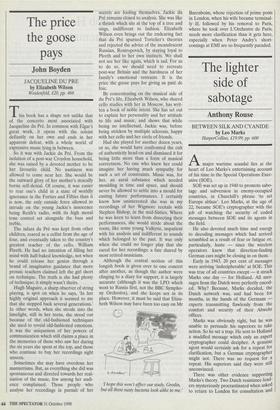The price the goose pays
John Boyden
JACQUELINE DU PRE by Elizabeth Wilson Weidenfeld, £20, pp. 466 This book has a shape not unlike that of the concerto most associated with Jacqueline du Pre. In common with Elgar's great work, it opens with the soloist defiantly on her own and ends in her apparent defeat, with a whole world of expressive music lying in between.
So it was with Jackie du Pre. From the isolation of a post-war Croydon household, she was raised by a devoted mother to be her favourite child. No nastiness was allowed to come near her. She would be the outward glory of her mother's stoically borne self-denial. Of course, it was easier to rear one's child in a state of worldly ignorance in the Forties and Fifties than it is now, the only outside force allowed to intrude on the young Jackie's innocence being Reith's radio, with its high moral tone control set alongside the bass and treble.
The infant du Pre was kept from other children, reared as a cellist from the age of four, and eventually taken to the country's greatest teacher of the cello, William Pleeth. He had no intention of filling her mind with half-baked knowledge, not when he could release her genius through a brand of imaginative guidance that more prosaic teachers claimed left the girl short on technique. The truth is she had plenty of technique; it simply wasn't theirs.
Hugh Maguire, a sharp observer of string playing, is spot on when he says, 'In her highly original approach it seemed to me that she stepped back several generations.' In other words, when she strode into the limelight, still in her teens, she stood out because of the old-fashioned techniques she used to reveal old-fashioned emotions. It was the uniqueness of her powers of communication which still claims a place in the memories of those who saw her during the six years she spent at the top, and those who continue to buy her recordings sight unseen.
Sometimes she may have overdone her mannerisms. But, as everything she did was spontaneous and directed towards her real- isation of the music, few among her audi- ence complained. Those people who analyse her recordings in pursuit of her secrets are fooling themselves. Jackie du Pre remains closed to analysis. She was like a thrush which sits at the top of a tree and sings, indifferent to fashion. Elizabeth Wilson even brings out the endearing fact that du Pre spurned Tortelier's theories and rejected the advice of the incandescent Russian, Rostropovich, by staying loyal to Pleeth and to her own instincts. We shall not see her like again, which is sad. For us to do so, we should need to recreate post-war Britain and the harshness of her family's emotional restraint. It is the price the goose pays for giving us pate de foie.
By concentrating on the musical side of du Pre's life, Elizabeth Wilson, who shared cello studies with her in Moscow, has writ- ten a book of noble intent. She has set out to explain her personality and her attitude to life and music, and shows that while being no intellectual, Jackie was, before being stricken by multiple sclerosis, happy with her cello and her circle of friends.
Had she played for another dozen years, or so, she would have confronted the cult of authenticity head-on and dismissed it for being little more than a form of musical correctness. No one who knew her could imagine her having much sympathy for such a set of constraints. Music was, for her, an aural substance which needed moulding in time and space, and should never be allowed to settle into a mould for casting future performances. I certainly know how uninterested she was in my recordings of her Wigmore recitals with Stephen Bishop, in the mid-Sixties. Where he was keen to learn from dissecting their performances, she would stride about the room, like some young Valkyrie, impatient with his analysis and indifferent to sounds which belonged to the past. It was only when she could no longer play that she cared for her recordings; a fate shared by most retired musicians.
Although the central section of this longish book is given over to one concert after another, as though the author were clinging to a diary for support, it is largely accurate (although it was the LPO which went to Russia first, not the BBC Sympho- ny Orchestra), and she keeps sex in its place. However, it must be said that Eliza- beth Wilson may have been too easy on Mr `I hope this won't affect our study, Grodin, but all these nasty bacteria look alike to me.' Barenboim, whose rejection of prime posts in London, when his wife became terminal- ly ill, followed by his removal to Paris, where he took over L'Orchestre de Paris, needs more clarification than it gets here, especially when Peter Andry's short- comings at EMI are so frequently paraded.


















































































 Previous page
Previous page